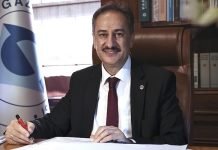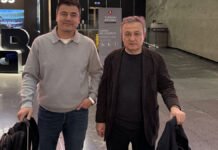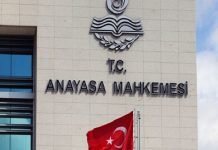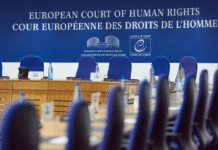
By Abdullah Bozkurt
Turkey’s National Intelligence Organization (MİT) had willingly and deliberately helped known Jihadists of Russian nationals who decapitated Aleppo’s Greek Orthodox Bishop Boulos Yaziji and Syriac Orthodox Bishop Yohanna Ibrahim in 2013.
They were caught in Turkey after a video emerged in June 2013 but they received lesser sentences on charges other than a murder of these priests when the Turkish intelligence and the Justice Minister Bekir Bozdağ intervened into the case. These bloody Jihadists are set to be free next month in Turkey.
Their name are Magomed Abdurakhmanov (AKA Abu Banat who was born on Nov.24, 1974 in Dagestan, a federal republic of Russia in the Northern Caucasus) and Ahmad Ramazanov (born on March 12, 1986 in Grozny, the capital city of the Chechen Republic, Russia). They are believed to be part of Jihadist group that decapitated prominent priests after their abduction in Syria. Abdurakhmanov personally beheaded one and helped decapitate the other based on seized murder weapon, forensic examination, his own testimony that corroborated by his accomplice. The shocking part is that these murderer were recruited by the MİT, provided with arms and logistical support while fighting against Bashar al-Assad regime.
KNOWN AL-QAEDA TRAFFICKER MOVED THEM AROUND
Both men had been in contact with a Turkish national Mevlüt Kuşman, a radical figure who was already under the investigation by Turkish police as part of an investigation into an al-Qaeda cell that was operating out of the Eastern province Van and İstanbul and that led by İbrahim Şen, a former Gitmo detainee and a convicted senior al-Qaeda militant. Kuşman (born on November 8, 1966 in Van province) had maintained a residence in İstanbul’s Bağcılar district and worked as a trafficker and supplier for al-Qaeda affiliated Jihadist groups.
The wiretap conversation that was recorded on June 20, 2013 showed Kuşman delivered military supplies, clothing and food to a man identified with only first name as Hasan who used a cell phone registered to a man Saeed Ameen Hussein al-Juboori. The delivery took place in the village of Başpınar on Turkish-Syrian border located in Kırıkhan district of Hatay province. Following the transaction, Kuşman picked up Jihadists who illegally crossed to Turkish territory from Syria and started driving towards Konya province with final destination being İstanbul.
Kuşman’s car was stopped by police units at Konya’s Cihanbeyli district where Abdurakhmanov, Ramazanov and a woman named Fatim Maden (24), a foreign national, were all detained along with another Turkish man named Sait Alp. Both Kuşman and Alp were released while foreign nationals were transferred to foreigners’ unit in Konya provincial police department. Although Abdurakhmanov was listed as a foreigner who are banned from entry into Turkey, he and the other two foreigners were all released to continue their journey to İstanbul. That shows these people were protected by Turkey’s intelligence agency.
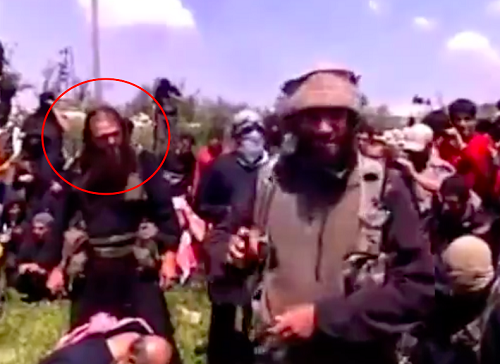
JIHADIST WHO WAS LET GO TURNED OUT TO BE MURDERER OF PRIESTS
On June 28, 2013, the murder footages of Aleppo’s Greek Orthodox Bishop Boulos Yaziji (also listed as Yazigi or Yazıcı), the Syriac Orthodox diocese of Aleppo Bishop Yohanna Ibrahim, and a third priest were emerged in Turkish media. Yaziji went into Syria on April 22, 2013 to meet Bishop Yohanna and they were kidnapped by unknown gunmen in the village of Kafr Dael, about 10 km from Aleppo. It turned out the priests were kept prisoners by a Jihadist group called Katibat al-Muhajireen (Jaysh al-Muhajireen wa’l-Ansar), designated as terrorist group by the US and Canada. When the horrible pictures of decapitation emerged in June 2013, Konya police units identified Abdurakhmanov as the man who appeared in the picture.
That verification prompted İstanbul police to raid several addresses in İstanbul’s Bağcılar and Başakşehir districts on July 4, 2013, detaining Kuşman, Ramazanov and Abdurakhmanov, among other suspects. In the home and workplace of Kuşman, police found hand grenades, AK-47 clips, 186 bullets, walkie talkies, video cameras. In a bag that was found during the house search, police found clothes that resembled to the ones seen in the video as the outfit of Abdurakhmanov. Police also discovered a knife with sheath that looked identical to the knife used in the beheading according to the forensic examination.
SO MUCH INCRIMINATING EVIDENCE
Investigating judge at İstanbul No.2 Court formally arrested all three on charges of belonging to a terror group and possessing illegal explosive materials and they were jailed in İstanbul Maltepe L-type prison. Kuşman’s son Abdullah and Sait Alp was also named as suspects in the case but released pending trial. Alerted by the Interpol, Russian police also searched the home of Abdurakhmanov in Chechnia and found two grenades, two explosives, and fifty bullets.
There was enough evidence to charge Russian Jihadists on terror, violations of firearms and ammunition laws but to charge Abdurakhmanov on crimes against the humanity for the murders of priests which took place outside the borders of Turkey, prosecutors needed a permission from the Justice Ministry. The ministry turned down the permission request by the prosecutor’s office in İstanbul, saying that there is no need for such a permission in the investigation stage but required for the trial phase according to the Turkish Penal Code articles listed in the Law No.5237.
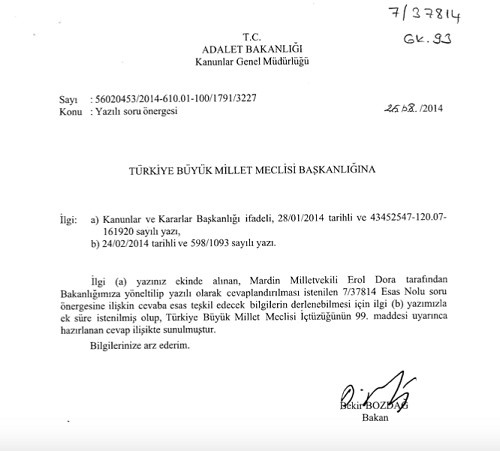
TURKISH JUSTICE MINISTER PREVENTS FILING MURDER CHARGES
In fact, responding to a Parliamentary question on this matter, Turkey’s Justice Minister Bekir Bozdağ said on August 25, 2014 that he advised prosecutors to continue the investigation and come back for a permission during the trial phase. But when his response was examined in detail, it was clear that Bozdağ was discouraging prosecutors to move on with charges of murder of priests, by saying that there is already a valid treaty on extradition agreement and mutual legal assistance with Syria that dated back on March 18, 1983 according to Official Gazette records.
The Article 12 of the Law no.5237 says a foreigner can be tried for crimes committed in another country if there is no extradition agreement or the recipient country refuses to take the suspect back. He said if there is sufficient evidence found on the murder, then the prosecutor may resubmit a permission request to the government. In short, with so many words, Turkish minister effectively telling the prosecutors to drop the charges against Abdurakhmanov.
In fact, that is exactly what happened in the case. Reading the messages of Turkish Justice Minister between the lines, prosecutors decided not to include murder charges in the indictment, citing the fact that murders took place in a foreign country and difficult in collecting evidence. They did not even bother to ask a renewed permission to charge the suspect on murder for the trial stage.
This was totally wrong from so many angles. For one, police criminal lab examination clearly identified Abdurakhmanov as the man who decapitated the priest from the video footage and the murder knife was discovered during the house search. Abdurakhmanov himself confirmed that he was the man on the footage during his testimony in the court (He even acknowledged he was the one who decapitated the priest in police questioning but recanted that in court hearing). Second, there is no practical application of existing extradition treaty between Turkey and Syria because of civil war in Arab country and Assad’s lack of control in many parts of Syrian territory. Third, this also contradicted Turkey’s official government position with respect to Bashar al-Assad regime for which it declared as illegitimate and instead recognized an interim government set up by opposition.
JIHADIST TESTIFIES HOW HE WORKED WITH TURKEY’S INTELLIGENCE AGENCY
The court testimony of Abdurakhmanov clearly indicated his close working relationship with Turkey’s intel MİT. He said he and other fighters had been in a continuous contact with the MİT. “After I was jailed here, I wrote letters to the intelligence [MİT] but did not receive any response. While we were in Syria, help was being provided to us from Turkey in the form of arms, funds and vehicles. I do not understand my current predicament and why I was kept in prison now”.
These words suggest Turkish intelligence dumped him after Abdurakhmanov got exposed but nevertheless helped him to get reduced sentence on lesser charges. Perhaps, the MİT also tried to protect itself from a host of international legal troubles by manipulating the case so that there were no charges filed on the murder of priests. Turkish government played along because it was Turkey’s autocratic President Recep Tayyip Erdoğan, then as a Prime Minister, was personally overseeing the Jihadists’ fights against Assad regime, hoping to replace him with his own proxy Islamist figure.
In his testimony, suspect Ramazanov said he was fighting as an Emir in Katibat al-Muhajireen, training other fighters, and met Abdurakhmanov there. He said the man in the murder video is Abdurakhmanov who decapitated one priest according to the Sharia court decision and help getting another one beheaded.
MURDERERS TO BE FREED FROM JAIL NEXT MONTH
A trial prosecutor, most likely selected especially for this case by the government, even asked for the acquittal of both Russian nationals. However the panel of judges disagreed. Perhaps a close interest in the case by both Russia and the US that have requested the turnover of the case file and evidentiary documents to them might have played a role in preventing a total hush-up of this case.
In the end, both men were sentenced to seven and a half years in prison each with charges of being a member of the terror organization. No murder charges filed and the court acquitted them of the charge on firearms violations. Kuşman was convicted on charges of terror membership (7 years 5 months), possession of dangerous material (4 years 2 months), and possession of unlicensed gun (1 year 3 months). Kuşman’s son Abdullah and Alp were acquitted.
US AND RUSSIA SHOULD INTERVENE
That means Abdurakhmanov and Ramazanov would be conditionally released on May 6, 2017 after serving only 3 years and nine months in the jail according to early parole rules. That is of course if no other charges filed against them by Turkish government which seems very unlikely given the fact that how it treated the case from the start. Both the US and Russia may want to take up the case from where the Turkish government left off, by asking their extradition so that they can be punished for the heinous murders of the priests. Erdoğan would not want that of course, fearing that their extradition may expose him to criminal liabilities. But it is worth to try at least for naming and shaming this Islamist leader who aided and abetted all sorts of radical fanatics in Syria.
April 13, 2017


